Related Research Articles
Obstetrics is the field of study concentrated on pregnancy, childbirth and the postpartum period. As a medical specialty, obstetrics is combined with gynecology under the discipline known as obstetrics and gynecology (OB/GYN), which is a surgical field.
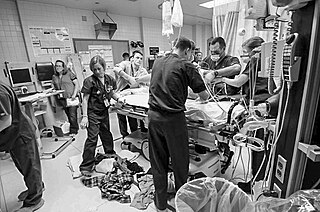
Emergency medicine is the medical speciality concerned with the care of illnesses or injuries requiring immediate medical attention. Emergency physicians continuously learn to care for unscheduled and undifferentiated patients of all ages. As first-line providers, in coordination with Emergency Medical Services, they are primarily responsible for initiating resuscitation and stabilization and performing the initial investigations and interventions necessary to diagnose and treat illnesses or injuries in the acute phase. Emergency physicians generally practise in hospital emergency departments, pre-hospital settings via emergency medical services, and intensive care units. Still, they may also work in primary care settings such as urgent care clinics.
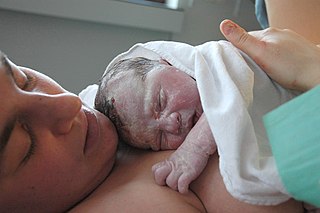
Childbirth, also known as labour or delivery, is the ending of pregnancy where one or more babies leaves the uterus by passing through the vagina or by Caesarean section. In 2015, there were about 135 million births globally. About 15 million were born before 37 weeks of gestation, while between 3% and 12% were born after 42 weeks. In the developed world most deliveries occur in hospitals, while in the developing world most births take place at home with the support of a traditional birth attendant.
In the medical profession, a general practitioner (GP) is a medical doctor who treats acute and chronic illnesses and provides preventive care and health education patient's illness. Their duties are not confined to specific organs of the body, and they have particular skills in treating people with multiple health issues. They are trained to treat patients of any age and sex to levels of complexity that vary between countries.
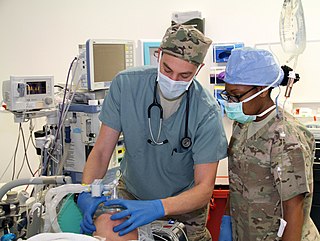
Anesthesiology, anaesthesiology, or anaesthesia is the medical specialty concerned with the total perioperative care of patients before, during and after surgery. It encompasses anesthesia, intensive care medicine, critical emergency medicine, and pain medicine. A physician specialized in anesthesiology is called an anesthesiologist or anaesthetist, depending on the country. In some countries, the terms are synonymous, while in other countries they refer to different positions and anesthetist is only used for non-physicians, such as nurse anesthetists.
The School of Nursing is the graduate school of nursing at Columbia University in the Washington Heights neighborhood of Manhattan, New York City. Founded in 1892, it stands as one of the oldest nursing schools in the United States.

The American Academy of Family Physicians (AAFP) was founded in 1947 to promote and maintain high-quality standards for family medicine, an offshoot of the classical general practitioner. It is headquartered in Leawood, Kansas.

A nurse practitioner (NP) is an advanced practice registered nurse and a type of mid-level practitioner. NPs are trained to assess patient needs, order and interpret diagnostic and laboratory tests, diagnose disease, formulate and prescribe treatment plans. NP training covers basic disease prevention, coordination of care, and health promotion, but does not provide the depth of expertise needed to recognize more complex conditions.
Nursing credentials and certifications are the various credentials and certifications that a person must have to practice nursing legally. Nurses' postnominal letters reflect their credentials—that is, their achievements in nursing education, licensure, certification, and fellowship. The letters usually appear in the following order:

Ira Robert Byock is an American physician, author, and advocate for palliative care. He is founder and chief medical officer of the Providence St. Joseph Health Institute for Human Caring in Torrance, California, and holds appointments as active emeritus professor of medicine and professor of community health and family medicine at the Geisel School of Medicine at Dartmouth College. He was director of palliative medicine at Dartmouth–Hitchcock Medical Center, from 2003–14, and associate director for patient and family-centered care at the affiliated Norris-Cotton Cancer Center.

Maternal–fetal medicine (MFM), also known as perinatology, is a branch of medicine that focuses on managing health concerns of the mother and fetus prior to, during, and shortly after pregnancy.

Obstetrical forceps are a medical instrument used in childbirth. Their use can serve as an alternative to the ventouse method.

The Sloane Hospital for Women is the obstetrics and gynecology service within NewYork-Presbyterian Hospital and the Department of Obstetrics and Gynecology of the Columbia University College of Physicians and Surgeons (P&S) in New York City. It was founded in 1886 with Columbia P&S as a training and treatment center for obstetrics. It has provided over 100 years of obstetrical care. The hospital is located within Morgan Stanley Children's Hospital.
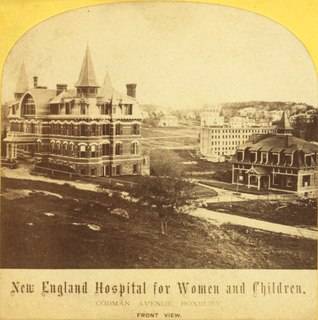
The New England Hospital for Women and Children was founded by Marie Zakrzewska on July 1, 1862. The Hospitals goal was to provide patients with competent female physicians, educate women in the study of medicine and train nurses to care for the sick. Until 1951 the hospital remained dedicated to women, it was then renamed to New England Hospital to include male patients. The hospital was renamed again to The Dimock Community Health Center in 1969. At present The Dimock Community Health Center provides a range of healthcare services including Adult & Pediatric Primary Care, Women's Healthcare and HIV/AIDS Specialty Care.
In 2006, hospice and palliative medicine was officially recognized by the American Board of Medical Specialties, and is co-sponsored by the American Boards of
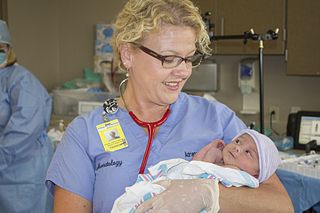
A neonatal nurse practitioner (NNP) is an advanced practice registered nurse (APRN) with at least 2 years experience as a bedside registered nurse in a level III NICU, who is prepared to practice across the continuum, providing primary, acute, chronic, and critical care to neonates, infants, and toddlers through age 2. Primarily working in neonatal intensive care unit (NICU) settings, NNPs select and perform clinically indicated advanced diagnostic and therapeutic invasive procedures. In the United States, a board certified neonatal nurse practitioner (NNP-BC) is an APRN who has acquired Graduate education at the master’s or doctoral level and has a board certification in neonatology. The National Association of Neonatal Nurse Practitioners (NANNP) is the national association that represents neonatal nurse practitioners in the United States. Certification is governed by the National Certification Corporation for Obstetrics, Gynecologic and Neonatal Nursing Specialties (NCC).
An obstetric hospitalist is an obstetrician and gynaecologist physician who is either employed by a hospital or a physician practice and whose duties include providing care for laboring patients and managing obstetric emergencies. Some obstetrics hospitalists also have responsibilities including resident and medical student teaching; providing backup support for family practitioners and nurse midwives, assisting private physicians with surgery, assuming care for ob-gyn patients unassigned to a physician and providing vacation coverage for the private practicing physician.

No Pain Labor & Delivery – Global Health Initiative is a non-for-profit organization. Founded in 2006, the program focuses on correcting the unnecessarily high caesarean delivery rate and the poor utilization of neuraxial labor analgesia in China.
Alice Benjamin is a Canadian specialist in fetal and maternal medicine.